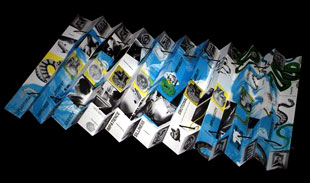2.5 x 22"; 40 pages. Four-color offset printed. A single sheet. Combination venetian blind/foldbook. Bound with cord strung through die-cut holes, which can be used to create different angles of viewing. The book cannot, however, be laid completely flat. Black embossed board covers with title blind-stamped on each. A powerful work that represents in physical, verbal, and visual ways the complexity of brain trauma, Memory Loss was inspired by a traumatic brain injury suffered by the artist's brother in 1986. The accordion structure combines fractured images and texts drawn from medical literature about head injury with personal photographs and correspondence. The book can be seen from many angles: as a static piece of sculpture from a "clinical" distance, or close at hand where manipulating the pages reveals personal struggles. Scott McCarney, The Biography of a Book: "Memory Loss came into existence as a book at the Visual Studies Workshop Press three years after it was conceived and five years after the event that inspired it. It uses elements of biography and autobiography to create an 'experiential autobiography' that exists only in the context of the book." "This book conveys the kaleidoscopic and shifting memory state of the artist's brother following an accident. The images unfold in ways that are unrelated logically. Yet we can sense psychological relations, and the struggle of a wounded brain to get back to is business of making sense. "On the bluer, less colorful side, images seem largely inspired by the world of medical care: various representations of the head and the brain, photographs in which the patient's full face [and thus the patient], seem elusive, and terms a doctor might use regarding affect in what look like rubber stamps: 'IMPULSIVITY,' 'IMPATIENCE,' 'EUPHORIA.' The reverse is brighter, more spacey, and with red, the images suggesting less the doctors looking a t the patient and more the patient looking into himself. A few sensuous details creep in: 'Pork Chops.' A few questions: 'huh?' He focuses on his hands, making shadow puppets, and struggling to get his fingers back to the notes of the guitar. The stamp-like script of the other side gives way to his own, still shaky, handwriting. Above all he writes to his artist brother, Scott: 'you're good therapy.' [Beyond the Text: Artists' Books from the Collection of Robert J. Ruben by Yvonne Korshak and Robert J. Ruben] |
